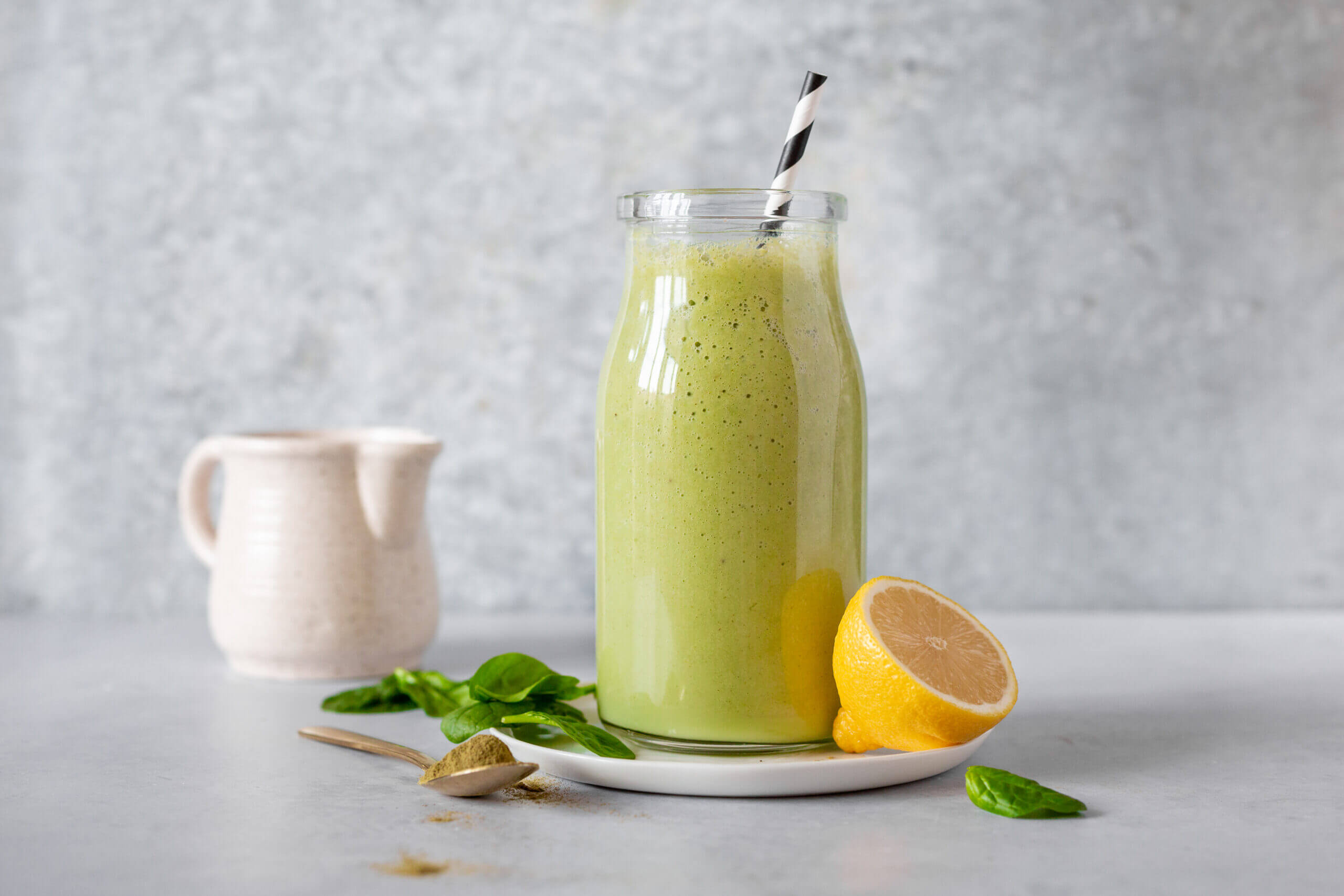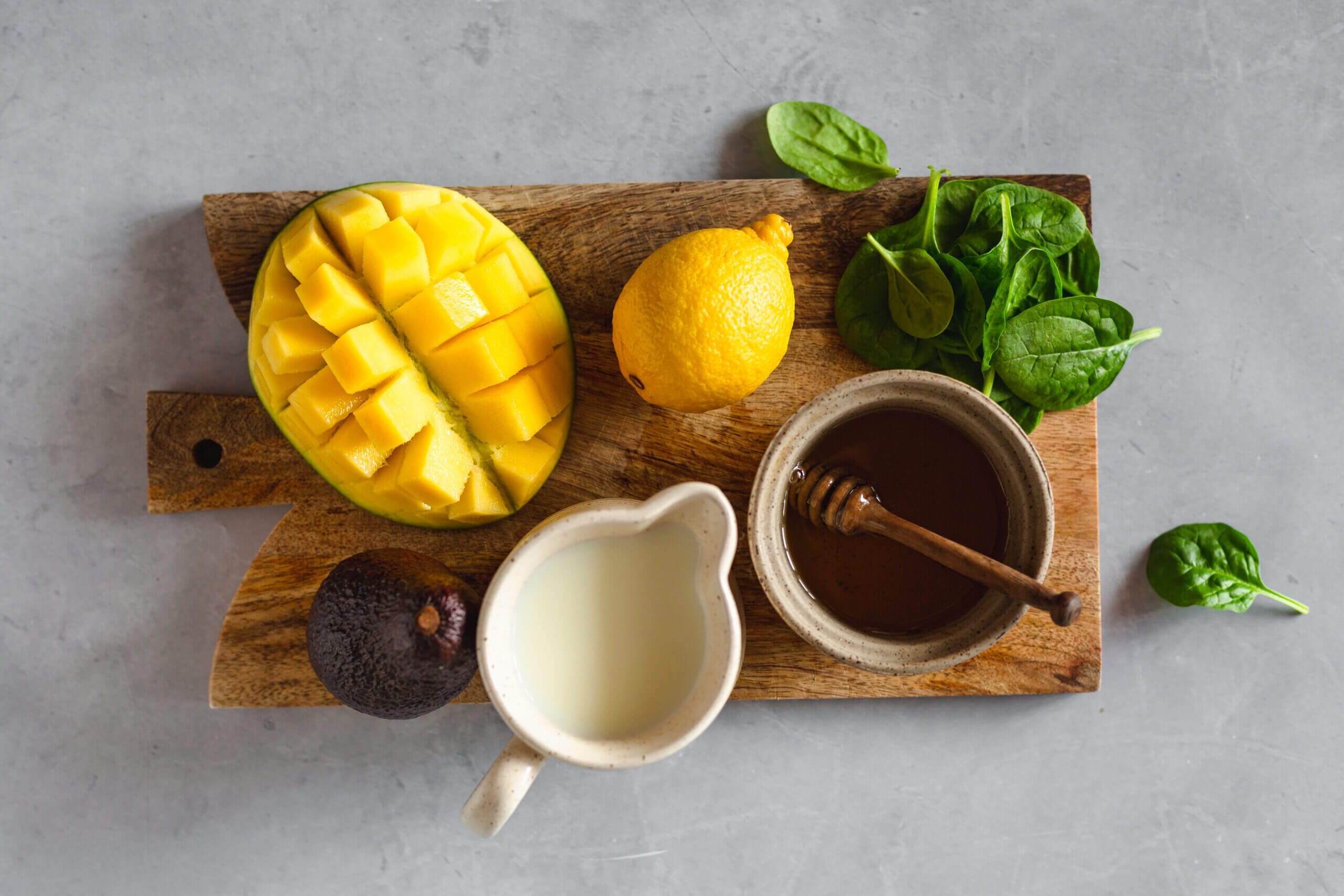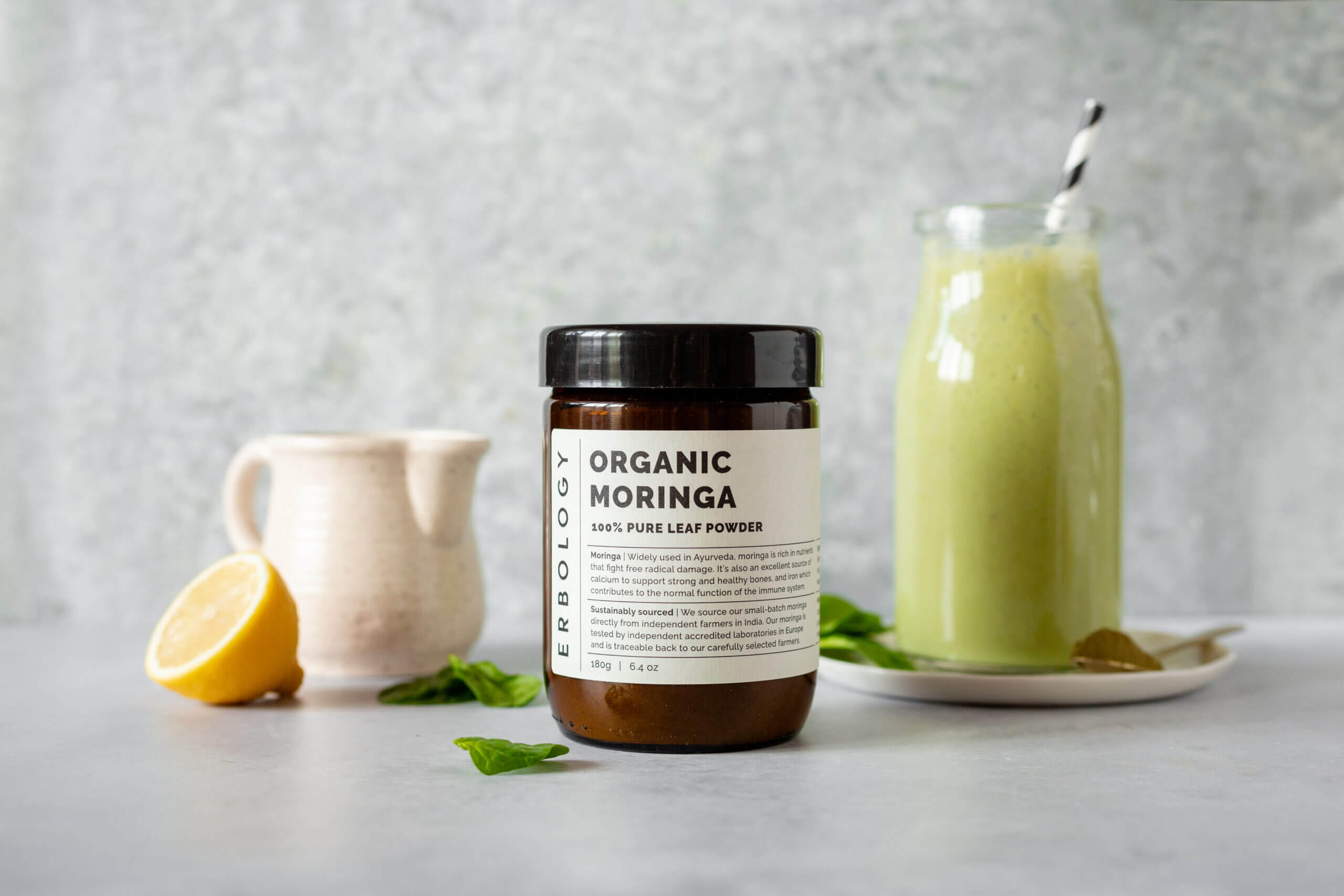Moringa and mango smoothie recipe
- 3

undefined 3'

undefined 5'

undefined

undefined
- 3

undefined 3'

undefined 5'

undefined

undefined
The magnificent mango
Mangoes have long been one of the world’s most popular fruits. With their sweet, juicy taste and appetising scent, it’s easy to see why! They’re wonderfully versatile, enabling us to use them in everything from a mango smoothie to salads, chutneys, and desserts. In fact, they’re so beloved that they’re the national fruit of not one but three countries: India, Pakistan, and The Philippines. As a bonus, mango is also the national tree of Bangladesh. It’s believed mangoes were first grown in India approximately 5,000 years ago.(1) The country is still the biggest producer of the fruit, although most of them are for domestic consumption. Beyond being delicious, mangoes have cultural significance too. It’s said that Buddha meditated in the peaceful shade of a mango tree, and so the fruit is considered sacred in Buddhism. Likewise, mango leaves are a common decoration in Hindu festivals. Here in the UK, we source our mangoes from all over the globe, including Brazil, Peru, and the Ivory Coast. Botanically speaking, scientists classify mangoes as drupes – fleshy fruits with a thick skin and central stone containing the seed. This puts them in the same family as cherries, plums, and even pecans. There are hundreds of different varieties, each with a unique flavour, colour, and shape. Unfortunately, we tend to only find one or two kinds in the supermarket! To enjoy mangoes at their best, try to pick one that’s slightly soft to the touch. If it’s hard, it’s not ripe yet. Conversely, avoid ones which feel mushy or have very soft spots. You should store unripe mangoes at room temperature – putting them in a paper bag can speed up the ripening process. Meanwhile, pop ripe mangoes in the fridge to stay fresh and flavourful, ready to use in a mango smoothie!
The health benefits of mango
It’s not just its gorgeous flavour that earned the mango its nickname as the king of fruits. Mangoes also have an impressive nutritional profile, giving the humble mango smoothie a wide variety of potential health benefits. For example, mangoes are rich in antioxidants called polyphenols, which protect our bodies from harm caused by free radicals.(2) This is important because research has linked free radical damage to a range of chronic diseases and signs of ageing.(3) These polyphenols could also have anti-cancer properties, with studies finding that they may help prevent the growth of cancer cells.(4) One of the most valuable polyphenols in mango is mangiferin. Research indicates that in addition to its anti-cancer effects, mangiferin helps support the health of your heart.(5) It does so by lowering levels of cholesterol in the blood, as well as protecting against inflammation. This is bolstered by the fact that mangoes contain the minerals magnesium and potassium, which help to reduce blood pressure.(6) Treating yourself to a mango smoothie could also be good for the health of your eyes. That’s because mangoes are rich in two carotenoids called lutein and zeaxanthin. These can help fight against age-related macular degeneration.(7) They may additionally protect the retina from sunlight, and even the blue light that digital devices emit.(8) Moreover, mangoes contain plenty of vitamin A, which further supports your vision. Finally, mangoes can be great for your digestive health. This is partly because they’re high in fibre, but also as a result of other beneficial compounds the fruit contains.(9) Thus mangoes could be helpful for conditions such as constipation and diarrhoea, as well as reducing gut inflammation. 
Tropical meets earthy: our moringa and mango smoothie recipe
You probably already have a good idea of how to make a mango smoothie. However, we’ve made a few tweaks to the standard recipe! Our moringa and mango smoothie recipe is more of a green smoothie than a typical tropical drink. This gives it a highly nuanced flavour and elevates its nutritional value even further. In addition to the mango, we recommend using half an avocado to give the smoothie a beautifully creamy consistency. We’ve also included half a cup of spinach to make sure you get that lush green colour. Both these ingredients bring their own fantastic health benefits too, which we’ll look at in a minute! To this base, you want to add the juice of half a lemon for a lovely hint of citrus. Yuzu and lime both make great alternatives if you’d like to mix things up a bit! You’ll note that the recipe calls for a couple of tablespoons of raw honey or agave nectar, but you can also use maple syrup. Feel free to adjust the amount so that you get the perfect level of sweetness to suit your tastes! Lastly, we’ve suggested using two cups of oat milk to ensure all the ingredients blend together smoothly. Of course, you can swap this for another type of plant-based milk, such as coconut, if you prefer. Naturally, the star of this moringa and mango smoothie is the moringa powder. It has a slightly bitter, grassy, and peppery taste that brings a delicious earthy quality to the drink. In this way, it’s similar to ingredients like matcha and spirulina. This is offset by the sweetness of the mango for a unique and satisfying smoothie. Plus, moringa has a whole wealth of health benefits – as you’ll see below!
Getting your greens
A mango smoothie isn’t exactly the most obvious way to consume your greens! However, adding avocado and spinach to the recipe brings lots of extra nutritional value. Starting with the ever-popular avocado, this is rich in numerous nutrients, including vitamins E and K. Vitamin K is often overlooked, but is vital for a range of functions. These include blood clotting and building healthy bones. Meanwhile, vitamin E is an antioxidant that helps support the immune system and health of your skin. In addition, avocados are a fantastic source of folate. This B vitamin helps to form DNA and RNA, plus break down the amino acid homocysteine. This is key because research has linked high levels of homocysteine with an increased risk of conditions such as stroke and dementia.(10) Turning to spinach, this leafy vegetable is overflowing with wellness-boosting vitamins and minerals. For instance, it’s rich in iron, which is crucial for maintaining healthy blood and staying energised. Spinach is also a good source of calcium, a mineral that’s famously important for building strong teeth and bones. All of which means this mango smoothie is a brilliant way to load up on an array of vital nutrients. This is especially true thanks to the addition of the moringa powder. 
Marvellous moringa
At this point, you may be wondering what exactly moringa is and why you’d want it in a mango smoothie. Well, it’s a large tree that’s native to India and people have been using in traditional herbal medicine for centuries. This might explain why it’s also referred to as both the ‘miracle tree’ and the ‘tree of life’. Almost every part of the plant gets used – from the pods to the roots – with the leaves most highly valued. You can eat these fresh, but they’re also dried and ground into a powder that you can add to food. This is a much more convenient option for those of us who don’t live in a country where moringa grows! So, exactly what benefits can you expect to gain by adding moringa to your mango smoothie? Let’s take a closer look.
The health benefits of moringa
People have been extolling the virtues of moringa for hundreds of years. However, it’s only recently that science has begun to systematically investigate these claims. The good news is that so far, the findings are looking positive for including it in your mango smoothie. For instance, some studies have found that moringa may help to lower blood sugar levels.(11) This is important because elevated blood sugar can raise the risk of harmful conditions such as heart disease. Results additionally indicate that moringa can assist in reducing cholesterol levels, which may also lower the risk of cardiovascular disease.(12) Furthermore, moringa is rich in antioxidants and could therefore help to reduce oxidative stress caused by free radicals.(13) Just like mango, this means moringa could lower the risk of chronic diseases such as diabetes. Similarly, initial studies suggest it may also have anti-inflammatory properties.(14) Long-term inflammation can contribute to a range of harmful conditions from arthritis to obesity, so this is another valuable benefit. Research also indicates that moringa may support our cognitive functions. Studies have found the plant could have neuroprotective effects and help to stave off disorders such as dementia.(15) Interestingly, it might even be effective for treating depression.(16) A mango smoothie may not be a typical bedtime drink, however people also use moringa as a traditional sleep aid. One reason for this is that the plant may help to naturally increase our melatonin levels. This enables us to drift off more easily. A recent study found that moringa seed extract may improve the quality of sleep, and could potentially help treat insomnia.(17) It’s important to note that many of these studies were based on animal models or small trials. As such, more research is required to clarify the extent of these benefits. 
Say hello to our organic moringa powder
We source our moringa directly from small, sustainable farms in India. After harvesting, the farmers dry the leaves and grind them into a fine olive-green powder, ready for your mango smoothie. We don’t use any additives or other unwanted ingredients, so what you get is 100% dried moringa leaves. Our team packs our Organic Moringa Powder in environmentally friendly amber glass jars to ship out to you. Please reuse or recycle them once they’re empty – the screw-top lid makes them great for storage! There are plenty of other ways to use this powder besides making a moringa smoothie. With its grassy flavour and beautiful green hue, a teaspoon of moringa powder is a lovely addition to a glass of sparkling water. Alternatively, you can go the traditional route and make it into a hot tea. Thanks to its above-mentioned benefits as a sleep aid, this is an ideal option before bed. You can also add moringa powder to food when you want to give a dish an extra boost of nutrition. Its mildly bitter taste is a wonderful complement to stews, soups, and salad dressings. But you’re not limited to savoury meals. Just like matcha, moringa brings a gorgeous depth of flavour to sweet bakes such as cookies and cakes. So have fun with it, and see which of your favourite recipes moringa powder works best with! From a moringa and mango smoothie to a moringa pesto on your pasta, the only limit is your imagination. One final point to note is that if you’re pregnant or taking medication, it’s best to consult with your doctor before using moringa.
How to enjoy our moringa and mango smoothie
This moringa and mango smoothie is perfect for any time of day. It’s a fantastic way to get a boost of nutrition first thing in the morning, especially if you dial down the sweetness. However, it’s equally enjoyable as an afternoon pick-me-up to avoid that post-lunch feeling of sluggishness! One great idea is to use frozen mango or spinach rather than fresh, to create an extra-refreshing drink. Alternatively, you can simply pop a couple of ice cubes into the blender along with the other ingredients. Either way, it’s the perfect choice for warm weather! Another option is to include a scoop of hemp powder to transform the drink into a mango protein smoothie. This is ideal for enjoying after a workout. Whenever and however you choose to sip your mango smoothie, we recommend drinking it as soon as possible after blending. That way it will be at its very freshest! Having said that, you can always store it in the fridge to enjoy later if that’s more convenient. The addition of moringa takes this mango smoothie recipe to the next level in terms of both taste and nutrition. We hope you love it as much as we do!
- 1 cup mango, peeled and cubed
- ½ medium-sized avocado
- ½ cup spinach
- Juice from ½ medium-sized lemon
- 2 tbsp raw honey or agave nectar
- 1 tsp Erbology Organic Moringa Powder
- 2 cups sweetened oat milk
- Size: 285 g
- Serv. size: 15 g
- Place the mango in a high speed blender together with the avocado, spinach, lemon juice, sweetener, moringa powder and oat milk.
- Blend well until smooth and creamy. Enjoy!